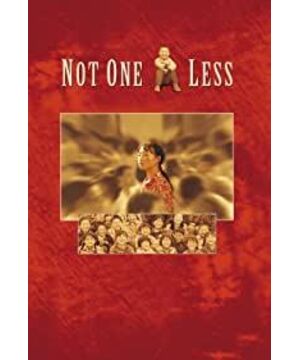The village chief stood in front of the table and lectured the pupils. As soon as he patted the table, the table fell down. He quickly held it up and said, "What's wrong? Why does this table have three legs? How about the money I gave Teacher Gao to buy the table?" The students answered: Teacher Gao bought chalk. The village chief stabilized the table and said, oh, buy chalk, forget it, and talk about it later.
This is an excerpt from Zhang Yimou's 1998 film "No One Less". This film reflects the reality of education in impoverished areas. Because of the innocence of the children, the film is even more funny than "The Lawsuit of Qiu Ju"; also because of the innocence of the children, it dilutes the heaviness of the reality of poverty.
Zhang Yimou has always been a more romantic director, and there is a kind of romanticism in his bones. In this film, he gave a bright ending to "revolutionary romanticism".
The substitute teacher Wei Minzhi is only 13 years old and still a child. She actually has no concept of money, and she doesn't plan carefully. She and the students moved 1,500 bricks and earned 15 yuan. The students were thirsty and begged her to buy two bottles of Coke at the store, and she did. Spend 6 yuan and buy it for everyone to drink together, each person has a sip. The child went to the city with 9 yuan to find out-of-school students, hoping to bring him back to school. There were only 6 yuan and 5 yuan left in her pocket, but she bought all the 6 yuan and 5 yuan for pen, ink and paper, and used it to write the missing person notice, but she didn't think about whether she still had money to eat.
She spent the night at the train station, writing missing person notices one by one. Someone at the train station told her that the tracing notice didn't work, so she'd better go to the TV station. She goes to TV. The TV station's doorman refused to let her in and asked her to wait outside. She was waiting for the director at the entrance of the TV station, and when she saw someone wearing glasses, she asked, "Are you the director?"
Wei Minzhi is such a simple child. Her simplicity finally startled the director. So the TV station did an exclusive interview program, and everyone was happy at the end.
Such an ending, though ridiculed by some critics, is possible. Media practitioners have always been a more compassionate and responsible group in our society. Otherwise, it is impossible to explain why so many unsuspecting people go to reporters and the media to get exposure. Media practitioners are the guardians of our social conscience.
In 2006, I returned to my hometown in Guangxi. Children in the village go to school for free, and those who live far away are also subsidized for room and board. The classrooms are spacious and bright, and the whole school has basic material conditions. However, compared with urban primary schools, there is still a big gap in hardware construction, and teachers are the weakest link. But only step by step. Perhaps in the next step, there should be literary and artistic works that reflect deeper issues. For example, the investment in education should be decided by the people, not by the government in a benevolent manner.
Watching this movie, the most unexpected gain is to discover that this society is indeed progressing.
View more about Not One Less reviews








